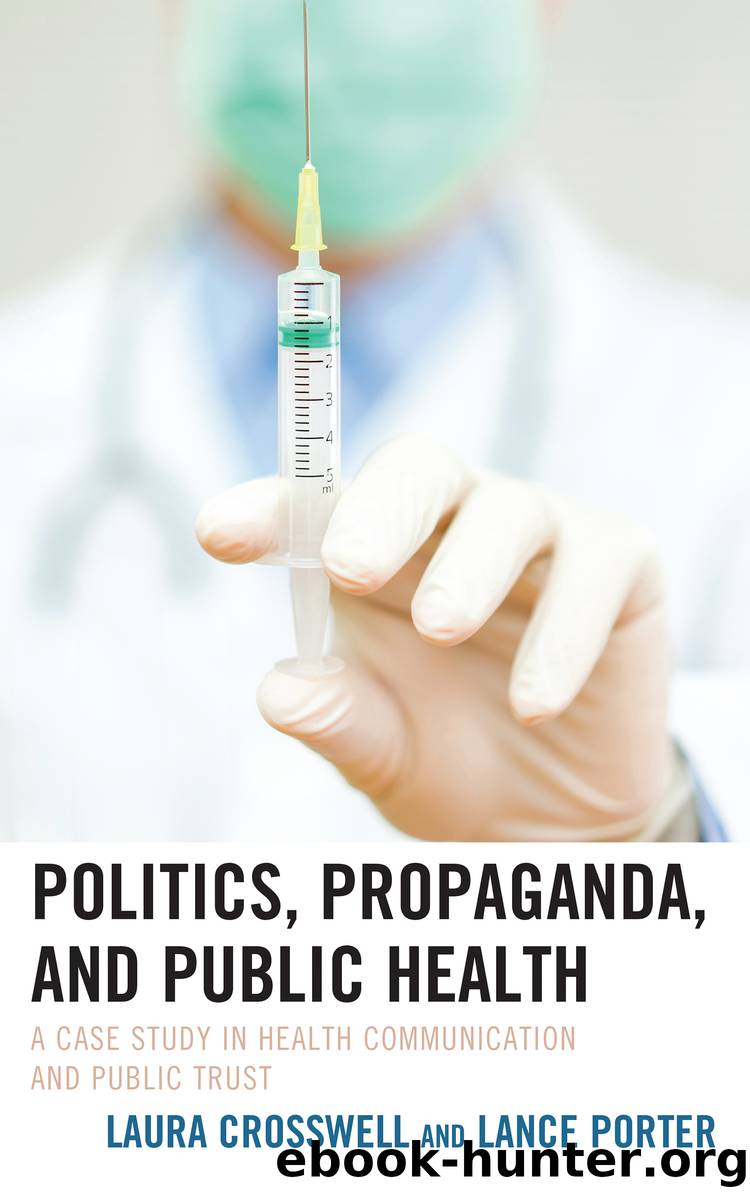Politics, Propaganda, and Public Health by Laura Crosswell Lance Porter & Lance Porter

Author:Laura Crosswell,Lance Porter & Lance Porter [Crosswell, Laura & Porter, Lance]
Language: eng
Format: epub
Publisher: Lexington Books, a division of Rowman & Littlefield Publishers, Inc.
Published: 2018-04-02T16:00:00+00:00
Discussion
This chapter relayed the opinions and perceptions of various state residents, offering an intimate portrayal of government administration and its role in vaccination communication. In-depth interviews offer firsthand accounts of ways in which the politicization of the HPV health issue shaped resident assessment of Rick Perry, Merck Pharmaceuticals, and the Gardasil vaccination. Our analysis suggests that despite diminishing levels of public trust, the U.S. electorate acquiescently exists within American corporatocracy. If citizens are in fact resigned to the commercial influences that flood day-to-day experiences, concern needs to shift to the social dynamics driving corporate control and the industry legacy in government legislation.
The circumstances surrounding the Gardasil vaccination, the social marketing campaign, and Rick Perry’s executive mandate introduce several key issues to the health communication regulation conversation. Though Merck’s Gardasil vaccination offers promising potential to reduce rates of cervical cancer, consumer knowledge “hinges on widespread public acceptance of HPV vaccination, especially among decision-makers” (Nan & Madden, 2012, p. 10). While Gardasil undoubtedly saves lives, our results show that preemptive marketing efforts and politicalized messaging may have compromised the informative value of HPV awareness efforts.
The underlying dynamics of unlimited commercial speech and limited FDA regulation support an increase in commercialized health care messaging. Without questioning the legitimacy or purpose of profit-driven communication, the implications of corporate control intensify as business agendas infiltrate public health sectors. U.S. Supreme Court Justices (White, Brennan and Marshall) attest that industry privileges have “placed [companies] in a position to control a vast amount of economic power by which they may, if not regulated, dominate not only the economy but also the very heart of our democracy, the electoral process” (Lasn, 2000, p. 160).
Though commercialism forms the foundation of America’s market economy, certain sectors of society require stronger protection against the laissez-faire system. Knowingly or not, corporations have systematically conditioned public acceptance of an industry presence across all levels of communication, coercing the masses into believing the “bottom line” is a standard part of societal operations. By allowing corporations to price every aspect of their lives, U.S. citizens forfeit personal autonomy and assume a completely commercialized existence by default. The United States can mitigate such threats by raising awareness of these agents of social control. While informed communication begins with mass media, the responsibility of social awareness falls upon the entire community. As Breton et al. (2007) suggest:
Significant actors in basic public policy change are not, strictly speaking, confined to the political sphere, but also include actors in the social sphere such as journalists, academics and representatives of civil society. These actors are part of an elite concerned with decisions and policy directions that affect a specific domain in society. The members of this elite are distinguishable from the general population by their means of action, e.g., budgets, legitimacy and scientific data, and their opportunities for access to the decision-making process through their network of contacts and access to the media. (p. 358)
Once key communities start recognizing and challenging the legitimacy of corporately funded health care systems, they
Download
This site does not store any files on its server. We only index and link to content provided by other sites. Please contact the content providers to delete copyright contents if any and email us, we'll remove relevant links or contents immediately.
The Vaccine Race by Meredith Wadman(1352)
Vaccine Epidemic by Louise Kuo Habakus(1317)
The Vaccine Court by Rohde Wayne(1188)
On Immunity: An Inoculation by Biss Eula(1026)
The End of Breast Cancer by Kathleen T. Ruddy MD(997)
Pox by Michael Willrich(966)
How to End the Autism Epidemic by J.B. Handley(904)
The Speckled Monster by Jennifer Lee Carrell(895)
Children's Medicines by Edward A. Bell(883)
Vaccine Epidemic: How Corporate Greed, Biased Science, and Coercive Government Threaten Our Human Rights, Our Health, and Our Children by Louise Kuo Habakus(880)
The Health of Nations by Karen Bartlett(856)
Vaccines: A Reappraisal by Moskowitz Richard(825)
The Official Autism 101 Manual by Karen L. Simmons(810)
Vaccine Injuries: Documented Adverse Reactions to Vaccines by Lou Conte Tony Lyons(809)
Vaccines Did Not Cause Rachel's Autism by Peter J. Hotez(775)
Arrowsmith (1925) by Sinclair Lewis(733)
The Vaccine Debate by Tish Davidson(731)
Understanding Hepatitis by Naheed Ali(676)
Politics, Propaganda, and Public Health by Laura Crosswell Lance Porter & Lance Porter(646)
